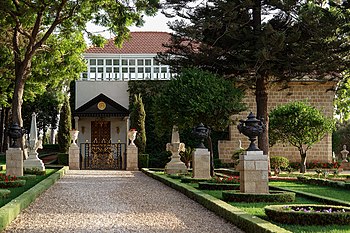Second Coming
The Second Coming (sometimes called the Second Advent or the Parousia) is the Christian belief that Jesus Christ will return to Earth after his ascension to Heaven (which is said to have occurred about two thousand years ago).Most English versions of the Nicene Creed include the following statements:[9] ...he ascended into heaven and is seated at the right hand of the Father.[10] Belief in the Second Coming was popularised in the US in the late nineteenth century by the evangelist Dwight L. Moody and the premillennial interpretation became one of the core components of Christian fundamentalism in the 1920s.According to historian Charles Freeman, early Christians expected Jesus to return within a generation of his death, and the non-occurrence of the second coming surprised them.[19] According to Larsen, the Oxford Universal Dictionary states that the latest attested use of genea in the sense of "class, kind or set of persons" dates from 1727.[20] Bible scholar Philip La Grange du Toit argues that genea is mostly used to describe a timeless and spiritual family/lineage of good or bad people in the New Testament, and that this is the case also for the second coming discourse in Matthew 24.He also lists the main competing translation alternatives, and some of the scholars who support the different views: Jesus is also recorded as saying, there are some standing here, which shall not taste death, till they see the Son of Man coming in his kingdom.He makes similar predictions in five other places in the Gospels.[23] In religious sceptic Victor J. Stenger's view, when the coming did not happen within the life-times of his disciples, Christianity changed its emphasis to the resurrection and promise of eternal life.[24] A competing view is that it is Jesus' coming in power on the mountain that provides the correct interpretative frame for the "not taste death" statement.The author of Second Peter describes the event: For we did not follow cleverly devised myths when we made known to you the power and coming of our Lord Jesus Christ, but we had been eyewitnesses of his majesty.[29] Yet some critics note that many are missing, such as "But the day of the Lord will come as a thief in the night, in which the heavens will pass away with a great noise, and the elements will melt with fervent heat; both the earth and the works that are in it will be burned up.[44] At the moment of Jesus' arrival, three events will happen all at once in an instant, in the blink of an eye: the living will die, the universe will be transfigured, and the dead will be resurrected, judged, and recompensed.[45] The second coming is suspended until Jesus is recognized by "all of Israel",[46] and it will be followed by a final and ultimate temptation to sin – in this case, apostasy – caused by the antichrist.[49] Like many Christian denominations, the church considers this second coming of Christ to be the final and eternal judgment by God of the people in every nation[50] resulting in the glorification of some and the punishment of others.[51] It is the traditional view of Orthodox Christians, preserved from the early Church, that the Second Coming will be a sudden and unmistakable incident, like "a flash of lightning".[52] They hold the general view that Jesus will not spend any time on the earth in ministry or preaching, but come to judge mankind.[66] According to the teachings of The Church of Jesus Christ of Latter-day Saints, the restored gospel will be taught in all parts of the world prior to the Second Coming.[67] Church members believe that there will be increasingly severe wars, earthquakes, hurricanes, and other man-made and natural disasters prior to the Second Coming.[71] They believe that Jesus' comparison of "the presence of the Son of man" with "the days of Noah" at Matthew 24:37–39 and Luke 17:26–30 suggests a duration rather than a moment of arrival.Other biblical expressions they correlate with this period include "the time of the end" (Daniel 12:4), "the conclusion of the system of things" (Matthew 13:40, 49; 24:3) and "the last days" (2 Timothy 3:1; 2 Peter 3:3).Historian Marguerite Beck Block writes, Now therefore it was time for a new church to be founded upon the earth, and for this purpose it was necessary for the Lord Himself to make his Second Coming to the sons of men.[86] In Islam, Jesus (or Isa; Arabic: عيسى ʿĪsā) is considered to be a Messenger of God and the masih (messiah) who was sent to guide banī isrā'īl (the Israelites) with a new scripture, the Injīl (Gospel).[89] There are also hadiths that foretell Jesus' future return such as:[90] Sahih al-Bukhari, Volume 3, Book 43: Kitab-ul-`Ilm (Book of Knowledge), Hadith Number 656: Allah's Apostle said, "The Hour will not be established until the son of Mary (i.e. Jesus) descends amongst you as a just ruler, he will break the cross, kill the pigs, and abolish the Jizya tax.Eventually, Jesus will slay the Antichrist Dajjal, and then everyone from the People of the Book (ahl al-kitāb, referring to Jews and Christians) will believe in him.Islamic texts also allude to the appearance of Ya'juj and Ma'juj (Gog and Magog), ancient tribes that will disperse and cause disturbance on earth.Muslims will then perform the Salat al-Janazah (funeral prayer) for him and bury him in the city of Medina in a grave left vacant beside Muhammad.Bahá'u'lláh announced that he was a manifestation of the returned Christ, understood as a reappearance of the Word and Spirit of God:O thou who art waiting, tarry no longer, for He is come.Due to this prophecy, Selassie was the source of inspiration of the poor and uneducated Christian populations of Jamaica, who believed that the Emperor would liberate the black people from the subjugation of European colonists."[108] Larry Dossey, M.D., wrote that "Paramahansa Yogananda's The Second Coming of Christ is one of the most important analyses of Jesus' teachings that exists.Many interpretations of Jesus' words divide peoples, cultures, and nations; these foster unity and healing, and that is why they are vital for today's world".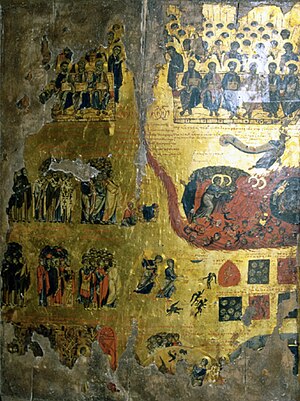
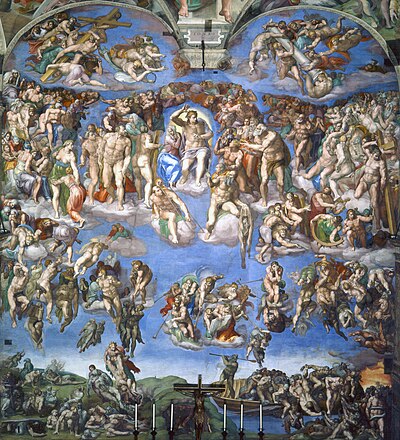

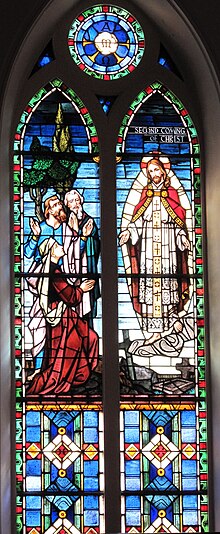
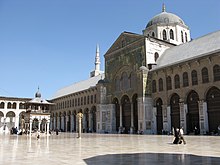
Second Coming (disambiguation)John TohabiSaint Catherine's MonasteryJesus in ChristianityChristologyNames and titlesChristLife of JesusGospelsGospel harmonyPlacesVirgin birthNativityBaptismMinistrySermon on the MountMiraclesParablesHumiliationCrucifixionInstrument usedTrue CrossBurialResurrectionAscensionObedienceHeavenly SessionIntercessionApparitions and visions of JesusJesus in IslamGospelDisciplesBackgroundBackground to the New TestamentLanguage spoken by JesusJesus's racegenealogyMental health of JesusJesus in historyChronologyHistorical JesusQuest for the historical JesusHistoricitySources for the historicity of JesusReliability of the GospelsMythologyJesus myth theoryCriticismUnknown yearsRelicsPerspectives on JesusChristianJewishTalmudIslamicAhmadiManichaeanMandaeanJosephusTacitusBar-SerapionJesus in cultureLife in artLife of Christ MuseumDepictionJesuismEventscanonical gospelsEarly lifeAnnunciationVisitationJoseph's dreamsAnnunciation to the ShepherdsAdoration of the ShepherdsCircumcisionAdoration of the MagiFlight into EgyptMassacre of the InnocentsPresentationReturn to NazarethFinding in the TempleTemptationCommissioning the Twelve ApostlesBeatitudesLord's PrayerPrayerRejectionTransfigurationPassionTriumphal entry into JerusalemTemple cleansingAnointingLast SupperFarewell DiscourseParaclete promisedAgony in the GardenKiss of JudasArrestSanhedrin trialMockingHerod's courtPilate's courtFlagellationCrown of ThornsVia DolorosaDescent from the CrossEntombmentHarrowing of HellEmpty tombNoli me tangereRoad to EmmausGreat CommissionRoad to DamascusJohn's visionJesus ChristHeavenmessianic propheciesChristian eschatologiesTheophanyChristophanytexts from within a religion or faith systemNew TestamentGreek New TestamentStephanasFortunatusAchaicus

